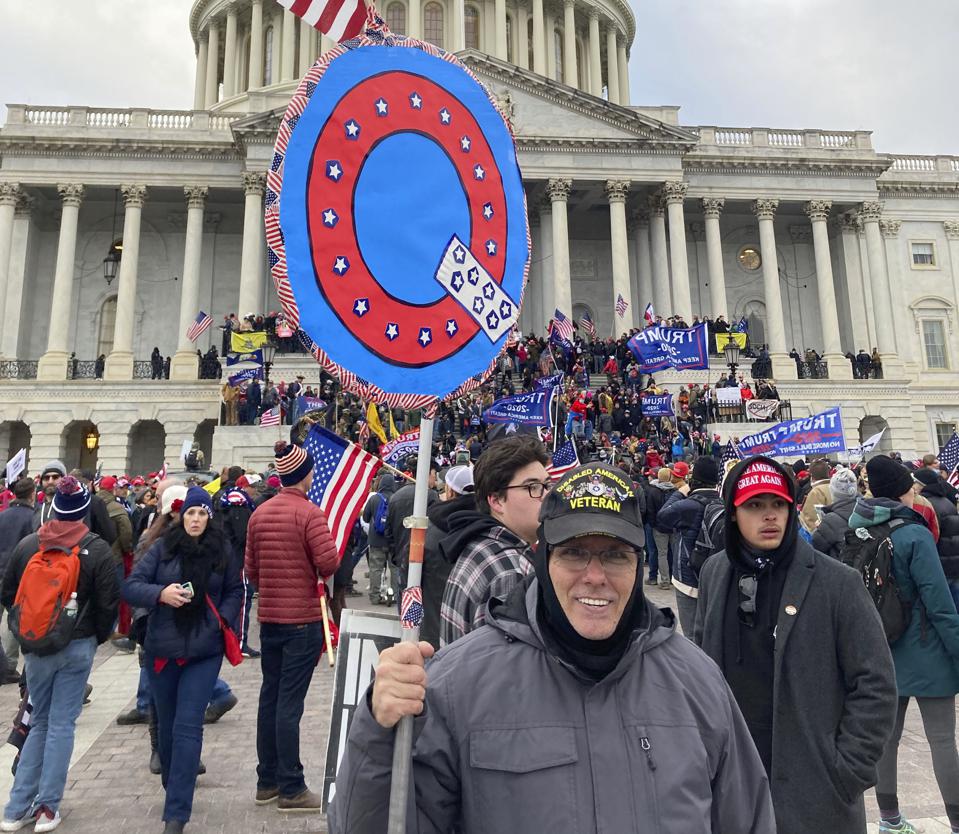QAnon Content Is ‘Evaporating’ From The Internet, New Report Finds
Topline
Since social media companies cracked down on QAnon content following the January 6 Capitol riot, catchphrases and secret messages related to the conspiracy theory have all but disappeared, a new report finds—an indication that Big Tech has the power to squash dangerous online movements when it wants to.

The United States Capitol Building in Washington, D.C., was breached by thousands of protesters … [+]
zz/STRF/STAR MAX/IPx
Key Facts
A report published by the Atlantic Council’s Digital Forensics Lab on Wednesday concluded that QAnon-related “chatter” surged at the beginning of the pandemic, peaked in June 2020 during the protests following George Floyd’s death, and spiked again in the lead-up to the January 6 Capitol riot.
Appearances of QAnon-related content on mainstream social media platforms decreased to “a low murmur” after social media companies tightened their moderation policies and banned thousands of QAnon accounts and groups after the Capitol attack, the report found.
The “prolonged silence” from the original “Q” poster, as well as former President Donald Trump’s 2020 election loss and “encouragement” from many in the Q online community to use different code language has also had an effect on the decline in QAnon-related chatter, but Big Tech’s crackdown had the most profound impact, the lab said.
Despite increased attention on alternative social media platforms like Parler, Gab and Telegram, QAnon-related chatter has not come close to reaching the scale it did on mainstream social media platforms.
Popular traditional QAnon catch phrases include “WWG1WGA” (“Where we go one we go all”), “the storm,” and the “great awakening”—which have been ditched by continued adherents of the conspiracy to avoid detection.
Crucial Quote
“These findings dissuade conceptions that QAnon followers are using alternative social media platforms in traditional ways at a scale that competes with their prior activity on mainstream platforms,” the researchers said.
Key Background
QAnon followers were anxiously waiting for the day when Trump would round up and arrest a global network of Hollywood actors, Democrats and other famous people they falsely believed were running a child sex trafficking ring. The adherents developed entrenched communities online, communicating with each other using code language and catchphrases. The January 6 attack was organized by many of the same right-wing message boards where the conspiracy theory thrived, and several rioters were identified as known QAnon influencers. After President Joe Biden was inaugurated on January 20 and the QAnon community’s big day, predictably, never came, many followers lost faith and the anonymous Q poster went silent.
What To Watch For
The report concluded some QAnon believers have continued their crusade by adapting their approaches and using different code language, a trend also reported by several news outlets. Some followers have replaced the conspiracy theory with a “neo-QAnon,” the researchers said, which exists as a “cluster of loosely connected conspiracy theory-driven movements that advocate many of the same false claims without the hallmark linguistic stylings that defined QAnon communities during their years of growth.” Asked whether these new QAnon communities were smaller in size than the traditional QAnon hubs, Jared Holt, one of the researchers behind the report, told Forbes it “varies.” “A lot of QAnon communities we’re aware of have pivoted on to other topics, like vaccine conspiracies and claims about the Biden Administration,” Holt said. “In that way, they’re plugging in to broader misinformation and disinformation ecosystems online, which tend to reach more people.” Still, the researchers found that these groups aren’t pushing “Q-specific” content the way they may have in the past.
Big Number
45 million. That’s how many mentions of QAnon terms there were on mainstream and alternative social media sites between January 1, 2020, and April 1, 2021, the researchers found.
Tangent
Some prominent QAnon influencers have recently endorsed what they call the “Domino theory,” which claims that Arizona’s controversial audit will prove there was election malfeasance, handing the state to Trump, before kick-starting audits in other states and eventually overturning the election.
Further Reading
‘We All Got Played’: QAnon Followers Implode After Big Moment Never Comes (Forbes)


